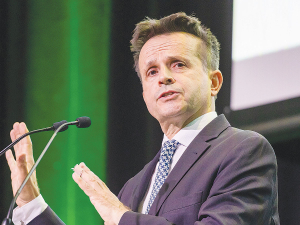New Order
OPINION: If old Winston Peters thinks building trade relations with new nations, such as India, isn't a necessary investment in our future, he has rocks in his head.
 Vangelis Vitalis says the average tariff for dairy is nearly double the average agricultural tariff.
Vangelis Vitalis says the average tariff for dairy is nearly double the average agricultural tariff.
New Zealand's top trade official has told dairy farmers that their sector faces the most trade barriers internationally.
Vangelis Vitalis, the deputy secretary for trade, told the DairyNZ Farmers Forum in Hamilton last month that the average agricultural tariff now is about 24%. However, the average tariff for dairy is more than 47%. He points out that the situation would have been worse if NZ didn’t have free trade deals in place in key export markets.
“And the tariff equivalent in a number of the big markets that we export to, if we didn’t have free trade agreements, would be in excess of 100%,” he says.
“So, the European Union, luckily, we’ve got an FTA, but the European Union tariff equivalent would have been 132%.
“With Japan, we also have a trade agreement through CPTPP, but the tariff equivalent there, if we didn’t have the FTA, is 180%.
“These are colossal figures, and there’s no sign of them coming down unless you’ve got these free trade agreements in place. Thats how we’re trying to manage, push down, give us some resilience, and give us some options.”
According to Vitalis, it’s not just the tariffs that are the problem for dairy exporters. It’s also the subsidies that other countries provide from taxpayer money to support their own farmers.
Back in 1995, two major economies— the US and the EU— accounted for about 78% of all subsidies. At the time, estimates suggested this lowered global prices by up to 7%.
Vitalis points out that in 2024, four economies— the US, European Union, China, and India—accounted for 80% of all international subsidies that distort prices.
“And the distortion— the lowering of prices—was about 14%. So, you’re getting lower prices because these four economies are subsidising their farmers to produce product that gets sold more cheaply, not at the market rate, but subsidised, and therefore depresses your prices.”
Vitalis says these subsidies can only be negotiated at the World Trade Organisation, which itself is facing challenges.
“But it is one of the places we do need to focus our attention on and not forget about. Tariffs are one thing. Tariffs, at least, are transparent. But the subsidies, those are the really challenging ones, and those are making a much greater impact on your bottom line as farmers.”
Environment Focus
Environmental issues now an integral part of free trade deals.
In 2018, the World Trade Organisation estimated there were just under 1,000 new environmental measures affecting trade.
Vangelis Vitalis says in 2023, more than 3,200 new measures were imposed for environmental reasons that impact trade.
“And the environment does matter. And it matters in a way that we need to understand the trade agreements that we’re negotiating. It’s important to remember we negotiate these trade agreements, but they don’t stand still. They get reviewed.”
He noted that in three years, NZ will be reviewing the FTA with Britain- where dairy access will be tarifffree within three years. In five years, the EU FTA comes up for renewal. Vitalis expects more questions around the environment.
Vitalis estimates that 85% of the questions that they were asked by British MPs during the ratification of the FTA were about food miles. In the EU, there were seven separate hearings, and of the nearly 900 questions that they were asked, 92% of those were either about the environment or sustainability.
“I do not think that in three and five years time, when these agreements come up for renewal, there will be fewer questions about the environment and about sustainability."
Recent weather events in the Bay of Plenty, Gisborne/Tairawhiti, and Canterbury have been declared a medium-scale adverse event.
DairyNZ's chief executive Campbell Parker says the 2024/25 dairy season reinforces the importance of the dairy sector to New Zealand.
A New Zealand agribusiness helping to turn a long-standing animal welfare and waste issue into a high-value protein stream has won the Australian dairy sector's top innovator award.
OPINION: A bumper season all around.
Dairy Women's Network (DWN) has announced that Taranaki dairy farmer Nicola Bryant will join its Trust Board as an Associate Trustee.
Rural Women New Zealand (RWNZ) says it welcomes the release of a new report into pay equity.
OPINION: Staying with politics, with less than nine months to go before the general elections, there’s confusion in the Labour…
OPINION: Winston Peters' tirade against the free trade deal stitched with India may not be all political posturing by the…